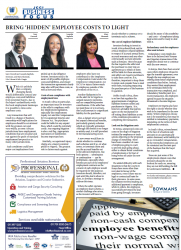Sean Omondi, Lusanda Raphulu and Mary Ekemezie - Bring Hidden Employee Costs To Light2017-11-28 While it’s unlikely that a company changing hands would deliberately conceal any employee costs and liabilities from potential buyers, due to the buyer’s unfamiliarity with the local employment landscape it is possible to miss some employee costs.
Any transaction that will result in a change of business ownership with implications for employees should be scrutinised with the greatest care and very widely, as some African jurisdictions have employment conditions that are peculiar and run against the grain of standard employment law practice in many other jurisdictions. Such conditions could have major cost implications if not picked up in due diligence reviews. Investors need to be aware of all possible employee costs and liabilities, and ensure the transaction agreements clearly state who will bear these costs, as well as how and when. Costs of non-compliance with employment laws In South Africa in particular, an important issue for investors is the seller’s compliance with key employment legislation, especially the Employment Equity Act and the Compensation for Occupational Injuries and Diseases Act. The purchaser could be liable for any unpaid fines, which could be extremely costly. Any ongoing litigation is also a red flag. Appropriate warrantees or indemnities become important here. Similarly, occupational injury claims are a major potential pitfall in Nigeria. The greatest risk is claims made against employers who have not contributed to the Employees Compensation Fund under the Employees Compensation Act (ECA) or injury claims made by employees outside of the provisions of the ECA. Another flashpoint to be on the alert for in Nigeria is unpaid statutory payments, such as compulsory pension contributions. If the seller has not paid these or is in arrears, this could amount to a significant liability for the purchaser. Also, a danger area is accrued but unpaid contractual benefits, particularly gratuity schemes which are typically unfunded. Although this benefit is no longer as widely used, it is still prevalent in the manufacturing sector. A new owner would have to decide whether to continue such schemes and if so, on what terms, or terminate them and pay the accrued benefits out to the affected employees. But both options â€" termination or continuation â€" can be problematic, especially when benefits are part of the employees’ employment contracts as the consent of each employee would be required for this purpose. Investors should, therefore, not wait until the deal is about to close, to develop a strategy to address this issue. Where the seller operates an employee share scheme, a similar challenge also arises, as the investor will have to decide whether to continue or to terminate such a scheme. The cost of employee liabilities Investors looking to invest in South Africa should look out for critical employee-related liabilities in respect of accrued annual leave, accrued severance and any other contractually accrued amounts such as bonuses. This is because the law requires the seller and the purchaser to enter into an agreement as to which of them will be liable for these amounts, and sellers can require purchasers to take these costs on. It is, therefore, important to keep them in mind, and consider how to deal with them, including impacting the purchase price of the business in question. Unlike South Africa, there is no law that regulates the apportionment of employee liabilities between sellers and purchasers in Nigeria. It is, however, advisable that parties agree on the mechanism for off-setting these liabilities as one of the conditions precedent to completing the transaction. Look out for litigation costs In Kenya, unexpected costs can come in the shape of litigation initiated by employees or trade unions objecting to the proposed change of ownership. There have been a number of cases of employees going to court to prevent deals going ahead, either to obtain better conditions of employment or for fear of being worse off under the new arrangement. The added difficulty with such situations is that the courts in Kenya have more often than not ruled in favour of the employees, even if there was no legal or contractual basis for their grievance. In some cases, the solution involved making an additional payment to employees, while in others, the employees successfully prevented the deal from going through. Investors should be aware of the possibility â€" and costs â€" of employees taking legal action and be ready to deal with it. Redundancy costs for employees who want to leave Redundancy costs might also have to be factored into Kenyan and Nigerian transactions if the employees decide not to continue with the new owners. In Kenya, there have been several cases where employees refused to sign the transfer agreement, even though the new employer was offering them better employment conditions than before. Instead, they wanted their employment to be terminated before the transaction was completed, and redundancy benefits paid. In a recent transaction, the employers agreed because the situation threatened to become litigious. Employees in Nigeria also have the right to decide whether they wish to be transferred to the new entity. Where employees choose not to be transferred, they may be entitled to redundancy payments, depending on the terms of their employment contracts. In South Africa, retrenchment in the face of a business sale amounts to an automatically unfair dismissal, with liability for up to 24 months’ remuneration, or the retrenched employees can be reinstated and become part of the business that the buyer has acquired. These are just some of the employment-related costs that investors should be on the lookout for early on, ensuring they are not left holding the bill for unforeseen liabilities. For further information, please contact: simon.dodd@bowmanslaw.com |
Sean Omondi, Lusanda Raphulu and Mary Ekemezie - Bring Hidden Employee Costs To Light
Copyright © 2024 KwaZulu-Natal Top Business
